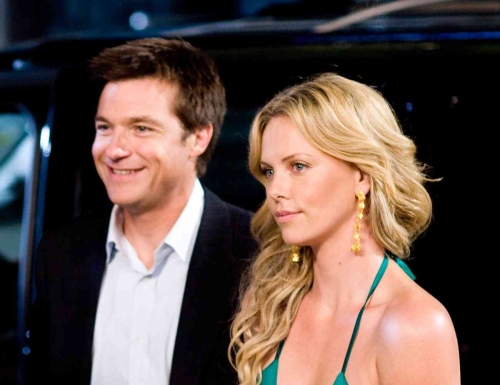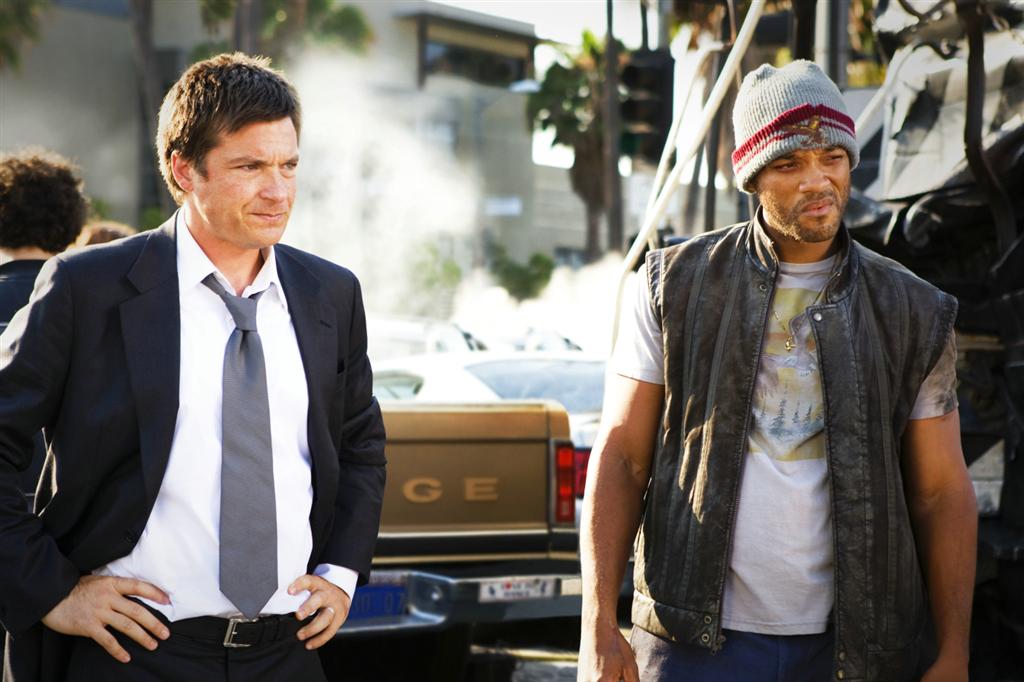

Director: Peter Berg, 2008.
Hancock has a strong cast, a great concept and yet is a disappointment. With the recent popularity of the superhero genre, this had tremendous potential to be a non-conventional version. But as with his previous movie, The Kingdom, Berg wastes his talented actors by switching gears half-way through.
The premise is promising. Hancock is a superhero with an attitude. He is a foul-mouthed alcoholic with super-strength, invincibility and the ability to fly. He saves the people of Los Angeles from criminals, but at what cost? Each act of "heroism" ends up costing millions to the taxpayer in destroyed property. He is a Frankenstein of a hero, a monster running amok.
The introduction says it all. Hancock is sleeping off a bender on a city bench while three criminals are leading the police in a chase through the streets of L.A. in a white SUV. Shades of OJ, but this chase is high-speed with submachine gun bullets flying everywhere. When a young boy wakes Hancock to call his attention to this chase and the police's need, instead of retreating to a phone booth, he grabs another bottle. Priorities, for Hancock, are askew. When he does fly into action, he ruins several police cars before stopping the criminals, leaving them hanging.
 If Hancock is a hero with attitude and behavioral problems, his foil, Ray Embrey, is a polyanna PR man with too much positive attitude. He is seen trying to change the world. But his vision is beyond his ability. After another unsuccessful pitch, he finds himself on the train tracks with a locomotive plowing down on him. With no way forward or backward, and a door handle stuck, Ray is seconds from death when Hancock steps in. But his method once again needs polishing. He saves Ray but leaves him upside down in his car while the train is destroyed. Ray, seeing how much the people who witnessed his salvation dislike Hancock for doing things wrong, senses opportunity. He may not be able to change the world, but he could change Hancock. This is Ray, riding the train tracks all the way to success.
If Hancock is a hero with attitude and behavioral problems, his foil, Ray Embrey, is a polyanna PR man with too much positive attitude. He is seen trying to change the world. But his vision is beyond his ability. After another unsuccessful pitch, he finds himself on the train tracks with a locomotive plowing down on him. With no way forward or backward, and a door handle stuck, Ray is seconds from death when Hancock steps in. But his method once again needs polishing. He saves Ray but leaves him upside down in his car while the train is destroyed. Ray, seeing how much the people who witnessed his salvation dislike Hancock for doing things wrong, senses opportunity. He may not be able to change the world, but he could change Hancock. This is Ray, riding the train tracks all the way to success. Will Smith plays Hancock as a surly superhero, a loner rejected by those he is trying to help. As in many of his movies he seems to play this kind of character with ease. You know that he will change by the end because this is Will Smith we are watching. Jason Bateman, who also starred in The Kingdom, is a good foil to Smith as the idealist PR man. His marriage to Mary (Charlize Theron) is unlikely in the extreme, but this is Hollywood, and he needs a beautiful wife to take care of his adorable son Aaron (Jae Head).
Will Smith plays Hancock as a surly superhero, a loner rejected by those he is trying to help. As in many of his movies he seems to play this kind of character with ease. You know that he will change by the end because this is Will Smith we are watching. Jason Bateman, who also starred in The Kingdom, is a good foil to Smith as the idealist PR man. His marriage to Mary (Charlize Theron) is unlikely in the extreme, but this is Hollywood, and he needs a beautiful wife to take care of his adorable son Aaron (Jae Head).As much as we want to root for Hancock, the film makes us ask what he sees in the people he helps. Why does he do it? He gets no thanks, no appreciation. All he gets is verbal abuse. He does not even want to be liked. He sees no reason to change. All he cares for is his whiskey. But inside is a rage and anger that he tries to hide. His kryptonite is being called an expletive. Like the Hulk, this is enough to make his blood boil. And when Hancock's blood boils, watch out.
 In seeing Hancock's weakness which turns him into a monster, even a bully, it is worth considering our own weaknesses. What is it that riles us? What hot buttons do we have that, when pushed, make us turn red with fury? How do we deal with these? Hopefully, not like Hancock with the use of power and strength. Perhaps we need our own Ray, a person who can help us change.
In seeing Hancock's weakness which turns him into a monster, even a bully, it is worth considering our own weaknesses. What is it that riles us? What hot buttons do we have that, when pushed, make us turn red with fury? How do we deal with these? Hopefully, not like Hancock with the use of power and strength. Perhaps we need our own Ray, a person who can help us change.Ray uses his spin-doctor work to change Hancock. Resisting this offer of help, Hancock wants nothing to do with change. That is, until he faces jail. Where Hancock sees conviction, Ray sees conversion: "People take you for granted, you know. We gotta make people miss you. People don't like you, Hancock." Convincing him to go to jail to leave a void where he used to be, Hancock agrees.
During the days of his incarceration, Hancock sits in on group therapy without participating. But when he finally shares with the group he gets a round of applause from his fellow cons. This is the first time he has felt acceptance. Almost immediately afterwards, he is asked to help the police and he emerges from jail to true superhero music. This is the beginning of the change. Yet it is only halfway through the movie.
The final half of the film descends into melodrama. There is a plot twist that comes out of left field, that leaves the movie focusing on who Hancock is and was, rather than who he is becoming. Despite some deft action, there is hokey plot development piled upon hokey plot development until the unbelievable climax. Mixed in there is wrong theology that should be evident to all.
Hancock gets us thinking and perhaps wishing for character change. What seems so easy here is, as we all know, difficult. But it's not impossible. We all have our flaws and faults. It's a truism that we can't feel our way into acting; we must act our way into feeling. When we take action, when we rise above our feelings and emotions, things can and do change. Hancock illustrates this so well. Like him, we can say to those around us, "You deserve better from me. I can be better. I will be better." And then take action to make this a reality, not a fiction.
Moreover, Hancock leaves us pondering attitude. His was a cynical and clouded attitude. A seen-it-all, leave-me-alone approach to life, it led directly to his unlikeable character. In contrast, Ray's let-me-at-it attitude led to his sunny disposition. Attitude is everything. It changes how we respond or react to what life throws at us. Biblically, we are called to have the same attitude as Jesus (Phil. 2:5). This Jesus, who was almighty, invincible, the supreme superhero, took on the attitude of humility. He looked not to his own needs, but to those who were in need. He had an attitude of compassion and love, of mercy and giving. How is your attitude?
Copyright ©2009, Martin Baggs

i no like this moooovie. -sarah
ReplyDelete